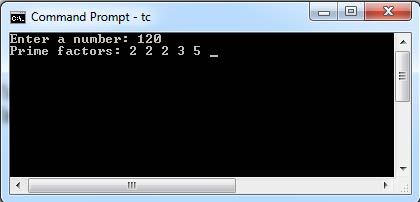As the name indicates, the prime factors of a given number are its factors that are also prime numbers, e.g., prime factors of 30 are 2, 3 and 5 but not 1, 6, 10, 15 and 30. One or more prime factors of a given number may repeat, e. g., prime factors of 120 are 2, 2, 2, 3 and 5.
To print all occurrences of a prime factor (say divisor) in given number num, use the while loop.
The statements within this loop are executed repeatedly as long as num % divisor is zero, i. e., divisor is a factor of num. Within the loop, first print the divisor as a factor and then remove it from num. Note that if divisor is not a factor of num, nothing happens in the loop.
To print all prime factors of a given number num, we can embed this code in another loop that tests the values of divisor from 2 to n-1. Within this loop, we can first test whether divisor is a prime number or not and if it is, separate all its occurrences from num using the while loop given above. Note that when all the prime factors in a given number are printed and removed, the value of num will be 1. Thus, the outer loop should continue as long as the value of num is greater than 1. A straightforward algorithm that uses this approach is given below.
/* Determine prime factors of a given number */
#include <stdio.h>
void main ()
{
int num, divisor; /* number and divisor */
clrscr();
printf(“Enter a number: “);
scanf (“%d”, &num);
/* determine and print factors */
printf(“Prime factors: “);
divisor = 2;
while (num > 1)
{
while (num % divisor == 0)
{
printf(“%d “, divisor); /* divisor is a factor, print it */
num /= divisor; /* remove the factor from num */
}
divisor++;
}
getch();
}

 Dinesh Thakur holds an B.C.A, MCDBA, MCSD certifications. Dinesh authors the hugely popular
Dinesh Thakur holds an B.C.A, MCDBA, MCSD certifications. Dinesh authors the hugely popular